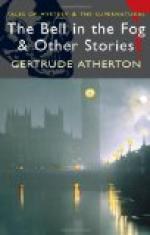For one hour Andrew sat there, and at its end he comprehended why the cottagers did not concern themselves about the tickets sold. Not one icy glance had been directed at the treble row of seats, not one inquiring stare bent upon the occasional tourist-couple who summoned courage to take a whirl. He and his companions might have been invisible intruders on a foreign planet, for all the notice the elect took of them. There was nothing overt, nothing unkind, but the stranger was as effectually frozen out as if he had fled before a battery of lorgnettes. The cottagers were like one large family. There was no more reserve among the young people than if they had been a party of happy well-trained schoolchildren. What wonder that the stranger within their gates felt his remoteness! During the “Lancers” they almost romped. They might have been on the lawn of one of their own cottages, and these outsiders hanging on the fence. To any and all without their world they were unaffectedly oblivious.
At the end of the hour Andrew rose heavily and left his seat. His face was gray, his knees shook a little. He understood.
* * * * *
But his cup of bitterness was not yet full. As he made his way down the passage behind one of the rows of chairs reserved for the cottagers, he beheld a girl who had just entered. He stood still and stared at her, wondering that he had ever thought other women beautiful. If those he had worshipped were princesses, this was a goddess. Only New York could give her that nameless distinction, so curiously unlike the graceful breeding of older lands,—the difference between the hothouse orchid and the lily of ancient parks. This girl’s figure was more Junoesque than was usual with her kind, her waist larger. She was very tall. Her carriage was one of regal simplicity, as if she were wont to walk on stars. Her shining brown hair was gathered into a knot at the base of her classic head. Her brow and chin and throat were perfect in their modelling. Her skin, of a marvellous whiteness, seemed to shed a light of its own; one might surely examine it with a microscope and find no flaw. Her mouth and nose were irregular, but her large blue-gray eyes shone triumphant, and she had beautiful ears. She wore a simple gown of pale blue organdie, clinging to her faultless figure, even at the throat and wrists. At her right was the new-found relative of the Webbs, half a head too short to reach that exquisite ear with his mumblings. About her were several other men.
Andrew’s capacity for love may not have been very profound, but he loved this woman at once and finally. It was a love that would have delighted the cynical Schopenhauer and the philosophical Darwin. The instinct of selection had never been more spontaneously and unerringly exercised. He was conscious of neither passion nor sentiment, however. She hovered in his visions as a companion at great functions—his possession whom all the world would envy. It was not so much she he loved as what she represented.




